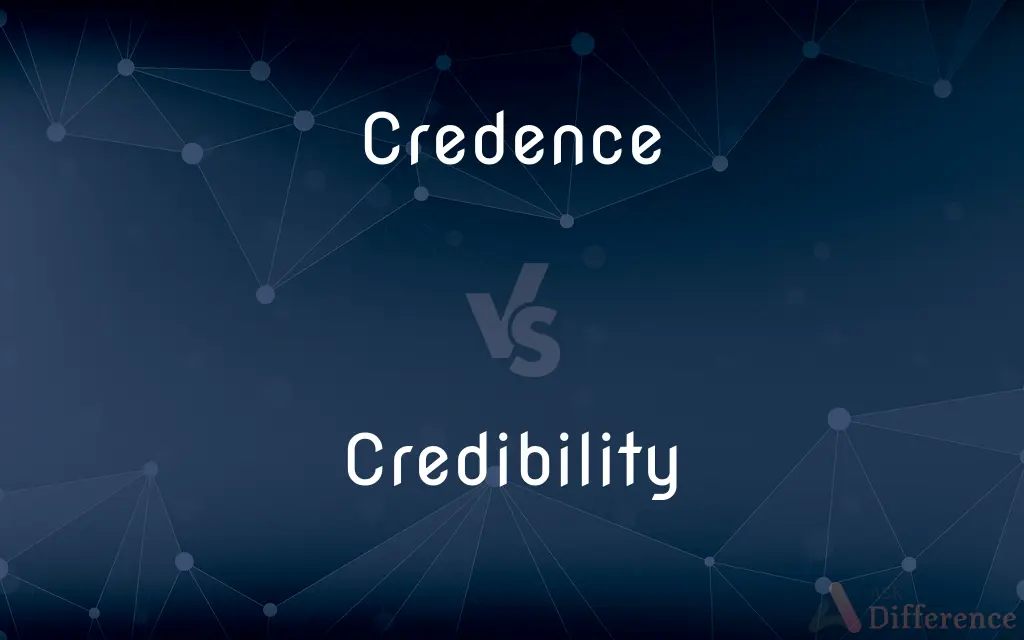Credence vs. Credibility — What's the Difference?
By Maham Liaqat & Urooj Arif — Updated on March 31, 2024
Credence refers to the belief or acceptance in something as true, whereas credibility is the quality of being believable or trustworthy.

Difference Between Credence and Credibility
Table of Contents
ADVERTISEMENT
Key Differences
Credence is about the acceptance or belief in something, often without the need for proof. It's about trust in the information or source based on personal conviction or acceptance. For example, folklore may hold credence among certain communities despite lacking empirical evidence. On the other hand, credibility focuses more on the objective basis of belief, assessing whether something or someone is worthy of belief based on evidence or track record. The credibility of a scientific study, for instance, depends on its methodology and peer reviews.
While credence can be given to ideas based on personal or cultural faith, credibility is earned through consistent evidence and reliability. An individual might give credence to a friend's advice based on past experiences, whereas a journalist's credibility is built through accurate reporting and adherence to ethical standards.
Credence often involves a subjective element, reflecting personal or communal values and beliefs. Whereas credibility is assessed through more objective criteria, such as verifiability, accuracy, and consistency.
In some contexts, credence may be influenced by emotions or pre-existing beliefs, making it less about factual accuracy and more about personal or collective identity. Credibility, however, is less susceptible to emotional bias and focuses more on factual grounding and logical reasoning.
While both concepts relate to trust and belief, the distinction lies in the basis and context of that trust. Credence can emerge from personal loyalty, cultural traditions, or emotional resonance, while credibility is more closely tied to empirical evidence and established reputations.
ADVERTISEMENT
Comparison Chart
Basis
Personal belief or acceptance
Evidence and reliability
Focus
Acceptance or trust in information
Worthiness of being believed
Criteria
Subjective (personal conviction, cultural beliefs)
Objective (verifiability, accuracy)
Influence
Can be influenced by emotions, traditions
Based on empirical evidence, consistency
Application
Often used in personal or cultural context
Used in formal, professional, or academic contexts
Compare with Definitions
Credence
Trust or confidence in a person or thing.
The diplomat’s words held much credence among international leaders.
Credibility
Trustworthiness of a source or text.
Fact-checking is vital for maintaining the credibility of journalism.
Credence
Belief in or acceptance of something as true.
The ancient legend gained credence among the villagers.
Credibility
The capacity to inspire belief or trust.
His extensive experience in the field adds to his credibility as an expert.
Credence
Support or evidence for a belief or theory.
The new findings give credence to the researcher's theory.
Credibility
The quality of being trusted and believed in.
The author's credibility was questioned after the discovery of plagiarized sections.
Credence
Acceptance based on the appearance of truth.
The convincing details of the story gave it an air of credence.
Credibility
Reliability in performing effectively.
The new software’s credibility is under scrutiny due to its frequent crashes.
Credence
The likelihood of something being true or believable.
His consistent honesty lent credence to his testimony.
Credibility
Dependability based on a consistent track record.
The safety record of the airline significantly enhances its credibility.
Credence
Acceptance as true or valid; belief
I wouldn't put too much credence in that story.
Credibility
Credibility comprises the objective and subjective components of the believability of a source or message. Credibility dates back to Aristotle theory of Rhetoric.
Credence
Credibility; plausibility
"A number of other details ... lend credence to her account" (Jane Mayer).
Credibility
The quality of being trusted and believed in
The government's loss of credibility
Credence
Recommendation; credentials
A letter of credence.
Credibility
The quality, capability, or power to elicit belief
"The scandals posed a crisis of credibility for collegiate athletics" (Taylor Branch).
Credence
A small table or shelf for holding the bread, wine, and vessels of the Eucharist when they are not in use at the altar.
Credibility
A capacity for belief
A story that strained our credibility.
Credence
(uncountable) Acceptance of a belief or claim as true, especially on the basis of evidence.
Based on the scientific data, I give credence to this hypothesis.
Credibility
Reputation impacting one's ability to be believed.
After weeks of blowing smoke, her credibility with me was next to nil.
Credence
Credential or supporting material for a person or claim.
He presented us with a letter of credence.
Credibility
(legal) Believability of statements by a witness, as measured by whether the testimony is probable or improbable when judged by common experience.
Credence
A small table or credenza used in certain Christian religious services.
Credibility
The quality of being credible; credibleness; as, the credibility of facts; the credibility of witnesses.
Credence
(countable) A cupboard, sideboard, or cabinet, particularly one intended for the display of rich vessels or plate on open shelves.
Credibility
The quality of being believable or trustworthy
Credence
(countable) A subjective probability estimate of a belief or claim.
My credence in the proposition is around 90%.
Credence
(obsolete) To give credence to; to believe.
Credence
Reliance of the mind on evidence of facts derived from other sources than personal knowledge; belief; credit; confidence.
To give credence to the Scripture miracles.
An assertion which might easily find credence.
Credence
That which gives a claim to credit, belief, or confidence; as, a letter of credence.
Credence
The small table by the side of the altar or communion table, on which the bread and wine are placed before being consecrated.
Credence
A cupboard, sideboard, or cabinet, particularly one intended for the display of rich vessels or plate, and consisting chiefly of open shelves for that purpose.
Credence
To give credence to; to believe.
Credence
The mental attitude that something is believable and should be accepted as true;
He gave credence to the gossip
Acceptance of Newtonian mechanics was unquestioned for 200 years
Credence
A kind of sideboard or buffet
Common Curiosities
How does credence differ from faith?
Credence involves acceptance based on personal or cultural belief, while faith is more often associated with religious conviction.
What is credibility?
Credibility is the quality or state of being believable or worthy of trust, usually established through consistent evidence and reliability.
Is credence always subjective?
While often subjective, credence can also be influenced by cultural or societal norms.
How can credibility be built?
Credibility can be built through consistent accuracy, reliability, and ethical behavior.
Can credence be given to scientific theories?
Yes, scientific theories can receive credence, especially when they provide compelling explanations before full empirical validation is available.
What is credence?
Credence is the belief or acceptance in something as true, often based on personal conviction rather than evidence.
Can credibility be lost?
Yes, credibility can be lost if evidence emerges that contradicts previous claims or if trust is broken.
How is credibility assessed?
Credibility is assessed through criteria such as track record, transparency, accuracy, and the presence of supporting evidence.
What makes a source credible?
A source is deemed credible if it consistently provides accurate information and can be verified.
What role does evidence play in credibility?
Evidence is crucial in establishing and maintaining credibility, as it provides a factual basis for trust.
Can personal bias affect credence?
Yes, personal bias can significantly affect the level of credence given to information or beliefs.
Does social media impact credibility?
Social media can both enhance and damage credibility, depending on the veracity and quality of the content shared.
Can a person have both credence and credibility?
Yes, a person can be both credible and given credence if they are trusted based on evidence as well as personal or cultural beliefs.
Does culture influence credence?
Culture can significantly influence what is given credence, based on shared beliefs and values.
How do misinformation and disinformation affect credibility?
Misinformation and disinformation can severely damage credibility by undermining trust and spreading falsehoods.
Share Your Discovery

Previous Comparison
Sovereign vs. Viceroy
Next Comparison
Purpose vs. ActionAuthor Spotlight
Written by
Maham LiaqatCo-written by
Urooj ArifUrooj is a skilled content writer at Ask Difference, known for her exceptional ability to simplify complex topics into engaging and informative content. With a passion for research and a flair for clear, concise writing, she consistently delivers articles that resonate with our diverse audience.














































